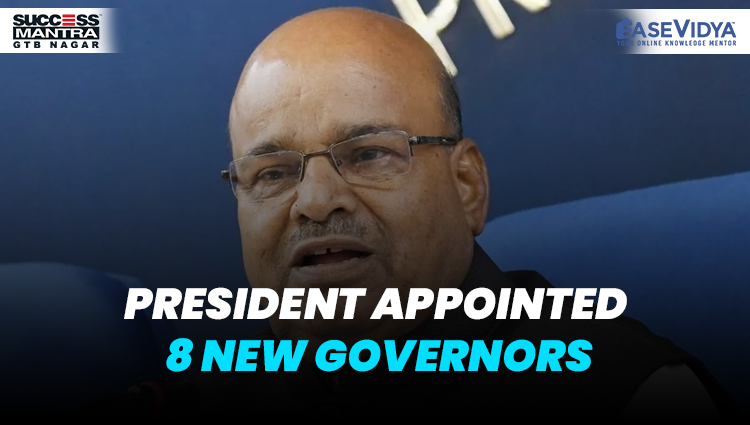
PRESIDENT APPOINTED 8 NEW GOVERNORS
PRESIDENT APPOINTED 8 NEW GOVERNORS
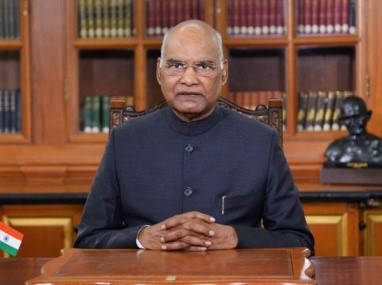
Eight states got new governors on July 6, 2021 as President Ram Nath Kovind made some major new changes. The new governors have been appointed for states including Haryana, Karnataka, Madhya Pradesh, Goa, Tripura,Jharkhand, Mizoram and Himachal Pradesh. While some of the current governors have been transferred to new states, in some others new appointments have been made. Union Minister Thaawarchand Gehlot has been appointed as the new Governor of Karnataka, while PS Sreedharan Pillai, the present Governor of Mizoram has been transferred to Goa. All the latest appointments will come into effect from the dates these Governors take charge of their respective offices.
There is a huge shuffle as one may understand:
Satyadev Narayan Arya was the Governor of Haryana, but now has been appointed as the Governor of Tripura whereas Bandaru Dattatraya who was the Governor of Himachal Pradesh is now the Governor of Haryana. PS Sreedharan Pillai was the Governor of Mizoram but will now serve as the Governor of Goa and Hari Babu Kambhampati is the new Governor of Mizoram. Ramesh Bias, Governor of Tripura is now the new Governor of Jharkhand. The appointments would take effect from the date these new governors take their offices.
FULL LIST OF NEW GOVERNORS
- PS Sreedharan Pillai, the current Governor of Mizoram, has been appointed as Governor of Goa.
- Union minister Thawarchand Gehlot has been appointed as Karnataka Governor.
- Bandaru Dattatraya, the present Governor of Himachal Pradesh has been appointed as Governor of Haryana.
- Satyadev Narayan Arya, the present Haryana Governor has been transferred and appointed as the new Tripura Governor.
- Mangubhai Chhaganbhai Patel has been appointed as the new Madhya Pradesh Governor.
- Rajendra Vishwanath Arlekar has been appointed as the new Governor of Himachal Pradesh.
- Hari Babu Kambhampati has been appointed as the new Governor of Mizoram
- Ramesh Bais, the current Tripura Governor has been appointed as Governor of Jharkhand.
CONSTITUTIONAL PROVISIONS RELATED TO GOVERNOR
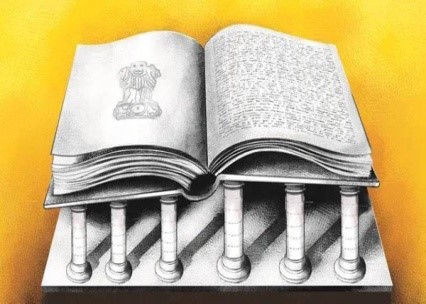
Article 153 says that there shall be a Governor for each State. One person can be appointed as Governor for two or more States. A Governor is appointed by the President and is a nominee of the Central Government. It is stated that the Governor has a dual role. He is the constitutional head of the state, bound by the advice of his council of ministers (CoM). He functions as a vital link between the Union Government and the State Government.
- Articles 157 and 158 specify eligibility requirements for the post of governor.
- Governor has the power to grant pardons, reprieves, etc. (Article 161).
- There is a CoM with the CM at the head to aid and advise the Governor in the exercise of his functions, except some conditions for discretion. (Article 163)
- Governor appoints the Chief Minister and other Ministers (Article 164).
- Governor assents, withholds assent, or reserves the bill for the consideration of the President passed by the Legislative Assembly (Article 200).
- Governor may promulgate the Ordinances under certain circumstances (Article 213).
CONTROVERSIES RELATED TO GOVERNOR'S ROLE:
- Abuse of Power by the Centre: There are numerous examples of the Governor’s position being abused, usually at the behest of the ruling party at the Centre. The process of appointment has generally been the cause behind it.
- Biased Ideology: In several cases, politicians and former bureaucrats identifying with a particular political ideology have been appointed as the Governors by the central government. This goes against the constitutionally mandated neutral seat and has resulted in bias, as appears to have happened in Karnataka and Goa.
- Puppet Rulers: Recently, the Governor of Rajasthan has been charged with the violation of the model code of conduct. His support of the central ruling party is against the spirit of non-partisanship that is expected from the person sitting on constitutional posts. Due to such incidents, negative terms like an agent of the Centre, Puppet and rubber stamps are used to describe a governor of the state.
- Favouring a Particular Political Party: Governor’s discretionary powers to invite the leader of the largest party/alliance, post-election, to form the government has often been misused to favour a particular political party.
- Misuse of Power: A Governor's recommendation for President's Rule (Article 356) in a state has not always been based on 'objective material', but on political whim or fancy.
RELATED RECOMMENDATIONS ON GOVERNOR'S ROLE
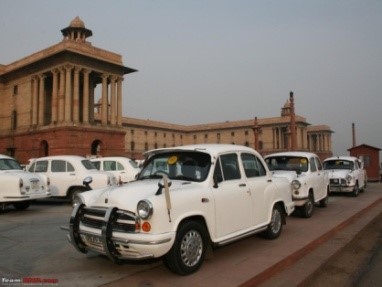
- On Appointment and Removal of Governor: The "Punchhi commission - 2010" recommended that there should be a provision for the impeachment of the governor by the state legislature. The state chief minister should have a say in the governor’s appointment.
- On the Use of Article 356: The "Punchhi commission - 2010" recommended that Articles 355 & 356 be amended. The Sarkaria Commission (1988) recommended that Article 356 should be used in very rare cases when it becomes unavoidable to restore the breakdown of constitutional machinery in the State. Recommendations have also been given by the Administrative Reforms Commission (1968), Rajamannar Committee (1971) and Justice V.Chelliah Commission (2002).
- On Dismissal of State Government under Article 356:R. Bommai Judgment (1994): The case put an end to the arbitrary dismissal of State governments by a hostile Central government. The verdict ruled that the floor of the Assembly is the only forum that should test the majority of the government of the day, and not the subjective opinion of the Governor.
- On Discretionary Powers: The Supreme Court in the Nabam Rebia judgment (2016) ruled that the exercise of Governor’s discretion Article 163 is limited and his choice of action should not be arbitrary or fanciful.
TEST YOURSELF
Q.1 Consider the following options & state which of the following is matched incorrectly?
- Bandaru Dattatraya ------ Haryana
- Mangubhai Chhaganbhai Patel ------- Gujarat
- Ramesh Bais ------- Jharkhand
- None of the following
Q.2 With the reference to the above mentioned passage, which of the following statements is/are correct?
- Eight states got new governors which includes states of Haryana, Karnataka, Madhya Pradesh, Goa, Tripura,Jharkhand, Mizoram and Himachal Pradesh.
- Satyadev Narayan Arya who was earlier the Governor of Uttarakhand, but now has been appointed as the Governor of Tripura.
- PS Sreedharan Pillai was the Governor of Mizoram but will now serve as the Governor of Goa and Hari Babu Kambhampati is the new Governor of Mizoram.
- I & II follows
- Only I follows
- I & III follows: ANSWER
- None of the following
Q.3 Which of the following given statements is/are incorrect in the reference to the constitutional position of Governor of the state?
- Reservation of a bill for the consideration of the President is by discretion of the Governor
- Recommendation of the imposition of the President’s Rule in the state is not as per the discretion of the Governor: ANSWER
- Ministerial advice is not binding on the Governor
- None of the above
Q.4 Consider the given statements and state which of the following is/are true regarding legislative powers of the Governor?
- Governors can reserve the bill for President consideration when it opposes a Directive Principle of State Policy.
- Governor calls for joint sitting of both the houses of state legislature (in case of bi-cameral legislature).
- He nominates 1 Anglo-Indian to the state legislative assembly.
- I & III follows: ANSWER
- I & II follows
- Only III follows
- All of the above
Q.5 In case of the death of a sitting governor, who among the following will discharge the functions of the governor of that state?
- The President of India
- The Chief Justice of the Supreme Court
- The Chief Justice of the concerned state high court
- None of the above: ANSWER










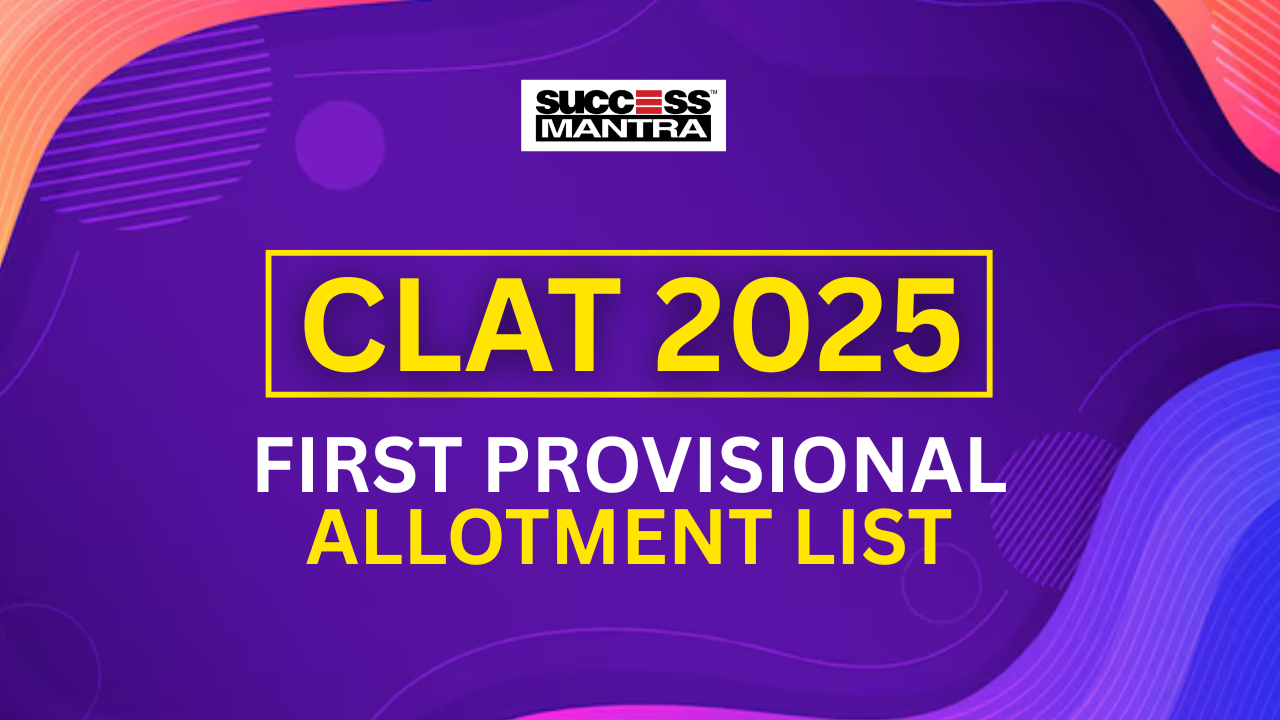


0 Comment